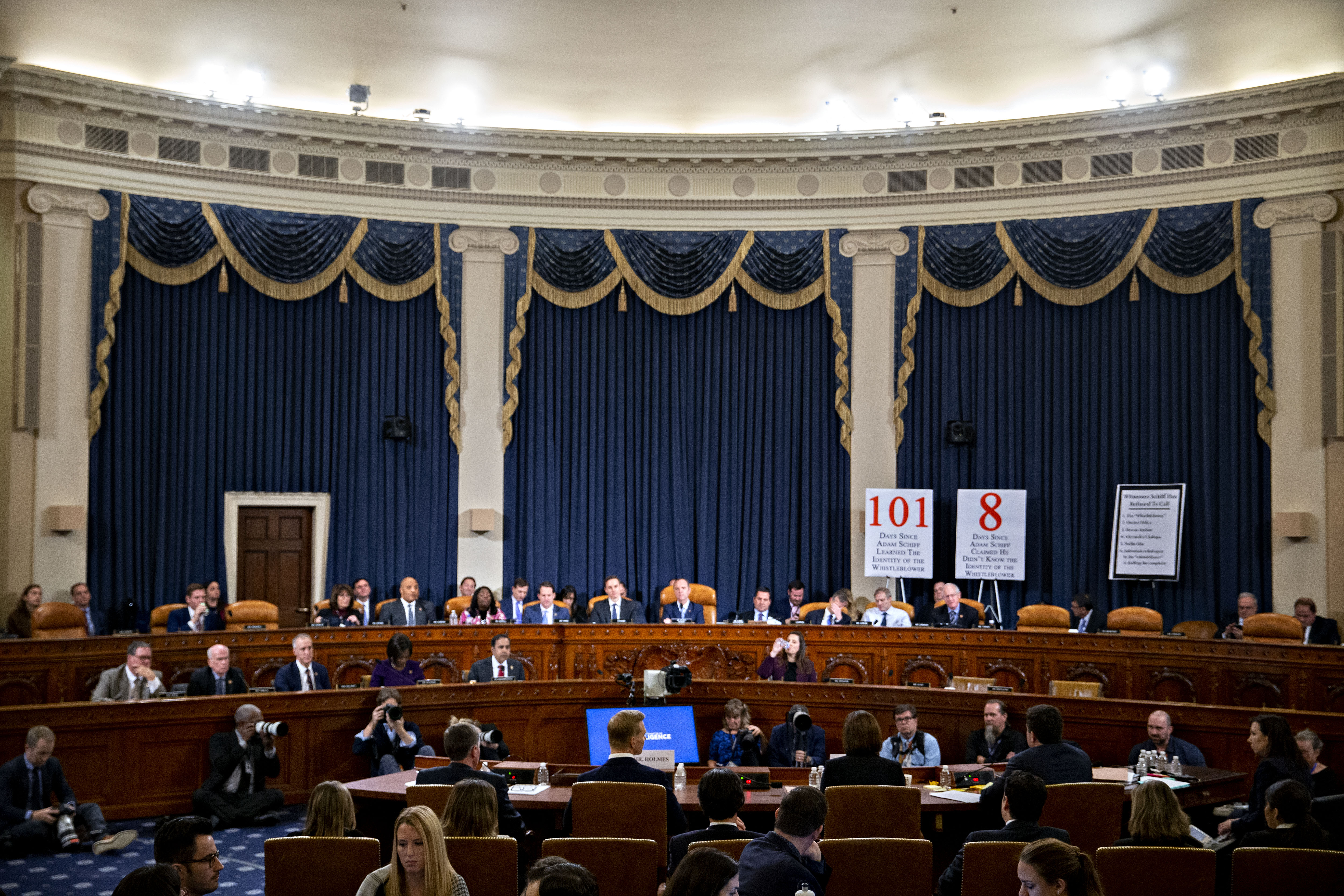Kin Cheung AP
HONG KONG — Election posters promoting the candidate for Mongkok North left no doubt about his affiliations: wearing all black, a yellow-hard-hat, respirator and goggles, he was firmly aligned with protesters seeking full democracy.
“Five demands, not one less,” read the banner, the mantra of the grass-roots uprising countering China’s tightening grip on Hong Kong.
In defeating the incumbent establishment candidate, Lucifer Siu contributed to a landslide win for the democracy camp in Hong Kong’s district council elections. A similar story unfolded citywide: a 23-year-old graduate beat a three-time incumbent in an establishment stronghold; a 25-year-old who crowdfunded his campaign ousted the vice-chairman of the main pro-Beijing party.
A record turnout of over 2.9 million voters delivered the pro-democracy camp control of 17 of 18 districts and over 80 percent of contested seats, the biggest electoral victory for the movement since Hong Kong’s handover from British rule in 1997. But it was also a rare chance for people within China to send their leaders a clear electoral message — that they want democracy, not overbearing control by Beijing, and they were prepared to look past protesters’ violence.
With this rebuke of its affiliates in the city, Beijing faces a choice between opening up politics as promised in Hong Kong’s mini-constitution, extending a crackdown on the pro-democracy protesters by the city’s police force and government, or trying to navigate a delicate middle path.
[Hong Kong’s pro-democracy parties sweep pro-Beijing establishment aside in local elections]
Beijing can continue to dig in, but would risk escalating and prolonging the conflict now that the electorate has spoken, said Ho-Fung Hung, an expert on the Chinese political economy and Hong Kong politics at the Johns Hopkins University’s School of Advanced International Studies.
“A wiser path is to replace Carrie Lam and reset the conversation,” he added, referring to Hong Kong’s chief executive.
Reacting to the outcome on Monday, Chinese state media blamed foreign forces, particularly the United States, for interfering. “China will respond tit-for-tat and resolutely counter any move by the U.S. that undermines China’s interests, and will never let them act willfully on Hong Kong affairs,” Xinhua News Agency said in an editorial.
Billy H.C. Kwok
AFP/Getty Images
Residents celebrate the defeat of Junius Ho, a pro-Beijing incumbent, outside a polling station early on Monday.
In a commentary, the nationalist Global Times tabloid called for “rational analysis,” noting that the unrest of recent months helped the democracy camp to mobilize support. “It is crucial to rationally interpret” the results, it said, “lest mobs should be emboldened by misreading them.”
The vote’s outcome surpassed even the most optimistic predictions among the pro-democracy camp, which had barely held 30 percent of district council seats previously.
[Day of rage plunges Hong Kong into turmoil after police shoot protester]
By midday Monday, pro-democracy parties had won 344 district council seats to the pro-Beijing camp’s 58, with independents winning 41 seats and nine constituencies still to declare, according to figures compiled by the South China Morning Post.
The district councils get to nominate 117 members to the 1,200-member election committee that chooses Hong Kong’s chief executive. That committee is typically dominated by pro-Beijing forces and sympathetic business interests, but pro-democracy forces will now have considerably more influence, to add to their existing support.
“It gives them probably not a majority but a meaningful chunk, and puts them in a position to be kingmakers,” said Antony Dapiran, a lawyer and author of books on Hong Kong’s protest movement.
Lam, Hong Kong’s embattled leader, said in a statement Monday that her government respects the election results and acknowledged “various analyses and interpretations.”
“Quite a few are of the view that the results reflect people’s dissatisfaction with the current situation and the deep-seated problems in society,” Lam added. “The Hong Kong government will listen to the opinions of members of the public humbly, and seriously reflect.”
Kin Cheung
AP
Candidates from the DAB, the main pro-Beijing political party, bow to apologize for their defeat in the local district council election in Hong Kong on Monday.
Susan Shirk, a China expert and former official in the Clinton administration who is now at the University of California, San Diego, said it was possible that Chinese leader Xi Jinping had not been receiving accurate information from lower-level officials on the public dissatisfaction in Hong Kong, despite months of protests.
“No one has wanted to give him bad news,” she said, describing the vote as a plebiscite on Beijing’s management of the financial hub. “The more than 70 percent of the Hong Kong public who voted in this election sent him a message he can’t ignore.”
Frank Pieke, director of the Mercator Institute for China Studies think-tank in Berlin, said China’s leaders must have been factoring in the possibility of a fairly heavy loss.
“Nevertheless it was so unequivocal, they must be scratching their heads and wondering ‘what are we going to do now?’” he said. “What they will have to do in Beijing is finally think about some concessions they will have to make.”
Pieke said those concessions did not necessarily have to be large, but could include, for example, an independent inquiry into allegations of brutality by Hong Kong police and protesters during the demonstrations.
There is no sign, however, that Beijing is prepared to grant Hong Kong the freedom to elect a government truly accountable to its own people, and one that could potentially represent the interests of the territory against those of the Communist Party, experts said.
Fazry Ismail
EPA-EFE/REX/Shutterstock
Prominent pro-Beijing lawmaker Regina Ip is escorted by police while surrounded by pro-democracy activists during a lunch time anti-government rally in central Hong Kong on Monday.
Hong Kong’s democratic bloc was quick to celebrate the victory, and its new status as the largest party in the district council, ending the dominance of the pro-Beijing Democratic Alliance for the Betterment and Progress of Hong Kong, or DAB, which fielded 181 candidates but only won 21 seats.
“The district council election fully shows that Hong Kong people will not accept the authoritarianism of the central government,” said Wu Chi-Wai, chairman of the democratic party. “The Hong Kong government must now seriously consider public opinion.”
Wu added that his party will push for Lam’s resignation and the reform of Hong Kong’s government, accountability for the Hong Kong police force and an overhaul of the political system.
[Attackers wielding Chinese flags bash Hong Kong protesters]
The DAB, meanwhile, acknowledged in a news conference that its showing was a record low. The party, which has the support of Beijing’s liaison office in the city and maintains close links to the Chinese Communist Party, explicitly backed a now-scrapped extradition bill that would have allowed criminal suspects to be sent to mainland China for trial. That bill was the spark for the discontent that has since morphed into a broader pro-democracy uprising.
“We have faced many challenges,” said Starry Lee, the party’s leader, who narrowly won reelection against Leung Kwok-hung, a Marxist social activist known as Long Hair. “We do not want to find any excuses for our loss,” Lee said, vowing to listen to Hong Kong communities and open a dialogue.
In downtown Hong Kong, dozens of officer workers wearing masks emerged from skyscrapers to celebrate the result. A man had popped a bottle of champagne and was distributing it in plastic cups to the crowd.
The celebrations kicked off when results first started trickling in early Monday, particularly in the constituency where Junius Ho, a stridently pro-Beijing politician, lost his seat.
In July, Ho was seen shaking hands with members of a mob on the night they attacked pro-democracy protesters in a subway station. He has threatened to kill advocates of Hong Kong independence, and recently used vulgar language toward a pro-democracy lawmaker. He has denied culpability in the mob attacks and says his threats have been taken out of context. He was also attacked with a knife and lightly injured during campaigning.
Anna Kam in Hong Kong and Liu Yang in Beijing contributed to this report.
Read more
Hong Kong’s pro-democracy parties sweep pro-Beijing establishment aside in elections
‘We are in a war’: Hong Kong accountant becomes street fighter by night
Hong Kong bars democracy activist Joshua Wong from elections
Today’s coverage from Post correspondents around the world
Like Washington Post World on Facebook and stay updated on foreign news
https://news.google.com/__i/rss/rd/articles/CBMivwFodHRwczovL3d3dy53YXNoaW5ndG9ucG9zdC5jb20vd29ybGQvYXNpYS1wYWNpZmljL2luLWhvbmcta29uZy1lbGVjdGlvbnMtYmlnLWRlZmVhdC1mb3ItZWxpdGVzLXByZXNzdXJlcy1iZWlqaW5nLXRvLXJldGhpbmstYXBwcm9hY2gvMjAxOS8xMS8yNS9lZjdiMWRiYy0wZjI5LTExZWEtOTI0Yy1iMzRkMDliYmM5NDhfc3RvcnkuaHRtbNIBzgFodHRwczovL3d3dy53YXNoaW5ndG9ucG9zdC5jb20vd29ybGQvYXNpYS1wYWNpZmljL2luLWhvbmcta29uZy1lbGVjdGlvbnMtYmlnLWRlZmVhdC1mb3ItZWxpdGVzLXByZXNzdXJlcy1iZWlqaW5nLXRvLXJldGhpbmstYXBwcm9hY2gvMjAxOS8xMS8yNS9lZjdiMWRiYy0wZjI5LTExZWEtOTI0Yy1iMzRkMDliYmM5NDhfc3RvcnkuaHRtbD9vdXRwdXRUeXBlPWFtcA?oc=5
2019-11-25 08:48:00Z
52780447335136






